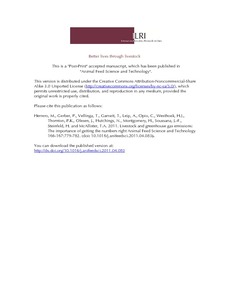Resource information
Estimates of global greenhouse gases (GHG) emissions attributable to livestock range from 8 to 51%. This variability creates confusion among policy makers and the public as it suggests that there is a lack of consensus among scientists with regard to the contribution of livestock to global GHG emissions. In reality, estimates of international scientific organizations such as the International Governmental Panel on Climate Change (IPCC) and the Food and Agriculture Organization (FAO) are in close agreement, with variation mainly arising on how GHG emissions are allocated to land use and land use change. Other estimates involve major deviations from international protocols, such as estimated global warming potential of CH4 or including respired CO2 in GHG emissions. These approaches also fail to differentiate short-term CO2 arising from oxidation of plant C by ruminants from CO2 released from fixed fossil C through combustion. These deviances from internationally accepted protocols create confusion and direct attention from anthropomorphic practices which have the most important contribution to global GHG emissions. Global estimates of livestock GHG emissions are most reliable when they are generated by internationally recognized scientific panels with expertise across a range of disciplines, and with no preconceived bias to particular outcomes.


